Hey eCommerce entrepreneurs! Want to take your online store to the next level with data-driven decisions? You’re in the right place!
In today’s competitive market, eCommerce analytics tools are essential for tracking customer behavior, identifying patterns, optimizing sales funnels, and boosting revenue. But with so many options available, choosing the right one can be overwhelming.
In this blog post, we’re going to introduce you to the top 10 eCommerce analytics software of 2025. But, before we dive into the tools, let’s first talk about how these tools can help your business.
Why Do You Need an eCommerce Analytics Tool?
As we mentioned earlier, eCommerce analytics tools play a crucial part in helping businesses make informed decisions. These tools help monitor and analyze customer behavior, identify patterns, and gain insights that can optimize sales and grow businesses.
Here are five ways eCommerce analytics tools can help your business:
- Understand and track customer behavior:
eCommerce analytics software helps you monitor and track customer behavior on your website. You can see how long they stay on a page, what products they view, and how often they return. By understanding your customer’s behavior, you can tailor your marketing strategy to their needs and preferences, which can help boost your sales. - Identify growth opportunities:
eCommerce analytics tools help you identify areas where your business can grow. By analyzing sales data, you can identify top-performing products, identify new products or services that are in demand, and discover new markets or niches to expand into. - Improve website performance:
eCommerce analytics tools can help you optimize your website’s performance. By analyzing website traffic, you can see which pages are most popular and where customers are dropping off. This information can help you make changes to your website that improve the user experience and increase conversions. - Better understanding of product performance:
eCommerce analytics tools allow you to track product performance and identify trends. You can see which products are selling well and which ones are not. By analyzing this data, you can make informed decisions about which products to stock and how to price them. - Spot potential issues:
eCommerce analytics tools can help you spot potential issues before they become bigger problems. By tracking customer behavior and sales data, you can identify issues such as slow website load times or low conversion rates. This information allows you to take action quickly to address the issue before it affects your bottom line.
Overall, eCommerce analytics tools provide businesses with valuable insights into customer behavior, sales trends, and website performance. Utilizing these tools can help businesses optimize their sales, expand into new markets, and stay ahead of potential issues.
So, let’s check out the best eCommerce analytics tools that can help you attain your business goals in 2025.
Best eCommerce Analytics Tools for Every Budget
Now that we’ve discussed how analytics tools for eCommerce can help your business, let’s explore some of the best eCommerce analytics software available for businesses of every size and budget.
In this section, we have handpicked 10 eCommerce analytics tools that offer robust features and analytics capabilities at different price points.
Whether you’re a small business owner just starting or a large corporation looking for enterprise-level analytics, you’ll find an eCommerce analytics tool on this list that meets your needs and budget.
Let’s dive in and explore the best eCommerce analytics tools for every budget.
KISSmetrics
KISSmetrics is one of the best analytics tools that helps eCommerce tracking. It monitors all information on visitor behavior. Most business owners prefer this eCommerce analytics tool because of the variety of integrations available from Magento and Shopify to Chargify and MailChimp.
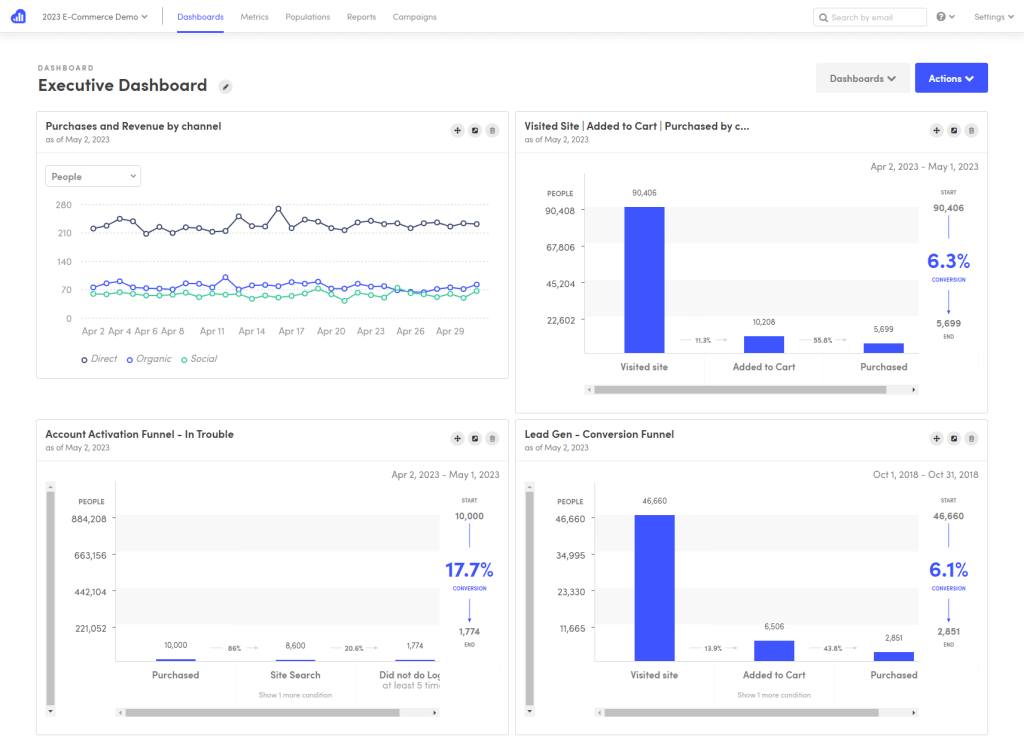
Pricing: start at $299/month
Features:
- Unlimited A/B test reports
- No-limit conversion periods
- Email support
- Unlimited testing/staging sandboxes
- Segment data by any point in time
- Multi and cross platform/device support
- Data export
Pros:
- Easy to see the exact flow that your users follow and can give insight into where you can improve.
- Extensive report data, and you can really dig down to find just about any information.
Cons:
- The cost is really not affordable for a small business or startup, but if you can budget it, the data is invaluable.
- No graphical outputs– it would be nice to have graphs for those clients that are more visual.
- Bit of a learning curve.
Google Analytics
Google Analytics is one of the most commonly used eCommerce analytical tools. It is utilized by site proprietors from all sides of the globe. Whatever you need either basic metrics or detailed reports, you can get them within this eCommerce dashboard.
The best part of utilizing Google Analytics is that there are a lot of assets and instructional exercises that can assist you in figuring out how to utilize it.
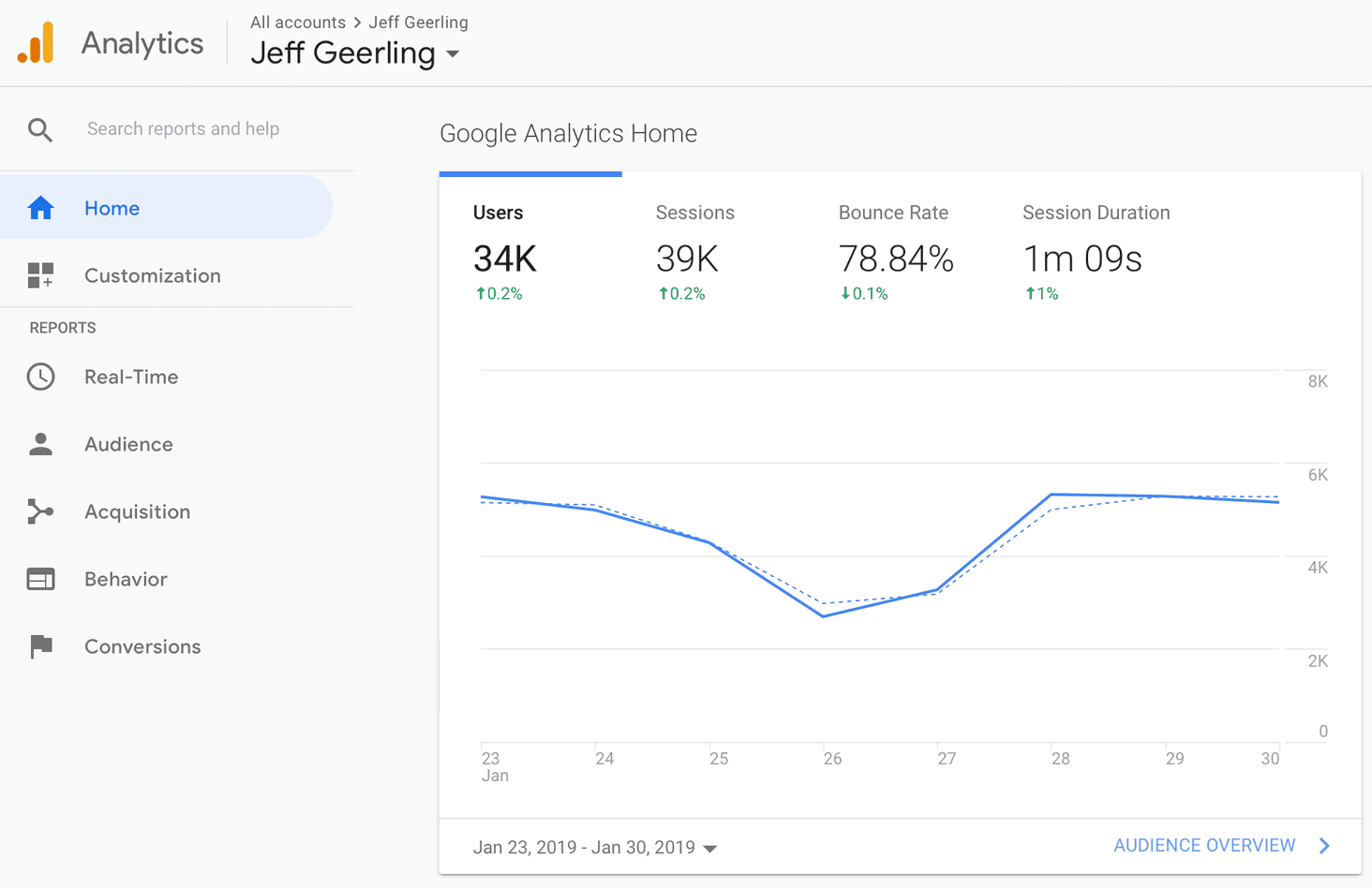
Pricing: Free
Features:
- Audience reports: Know your users.
- Custom reports: Analytics data, made to order.
- Campaign measurement: Traffic.
- Flow visualization: Follow every step.
- Track your Goals: Website conversions & user activity.
Pros:
- The most powerful website analytics with a lot of useful data
- Easy integration with third-party platforms e.g. Facebook and Google Ads
- Helpful AI system to spot data-reporting problems, and trends.
Cons:
- Very difficult to catch up with new features and updates
- Lack of end-user support
- It’s a bit hard to identify the middle part of the visitors’ journey.
Putler
Putler is the best all-in-one eCommerce tracking tool for businesses having multiple data points. By data points we mean, multiple websites, multiple stores, multiple currencies, multiple payment gateways, etc.
Putler helps combine, clean, and enrich all your data and shows you consolidated reports in a single place. This means, you no longer need to open multiple apps to monitor what’s happening in your business. Putler gives you a one-glance view and helps you stay in charge of your data.
With the help of Putler, you get accurate customer, sales, and product analytics on your eCommerce dashboard.
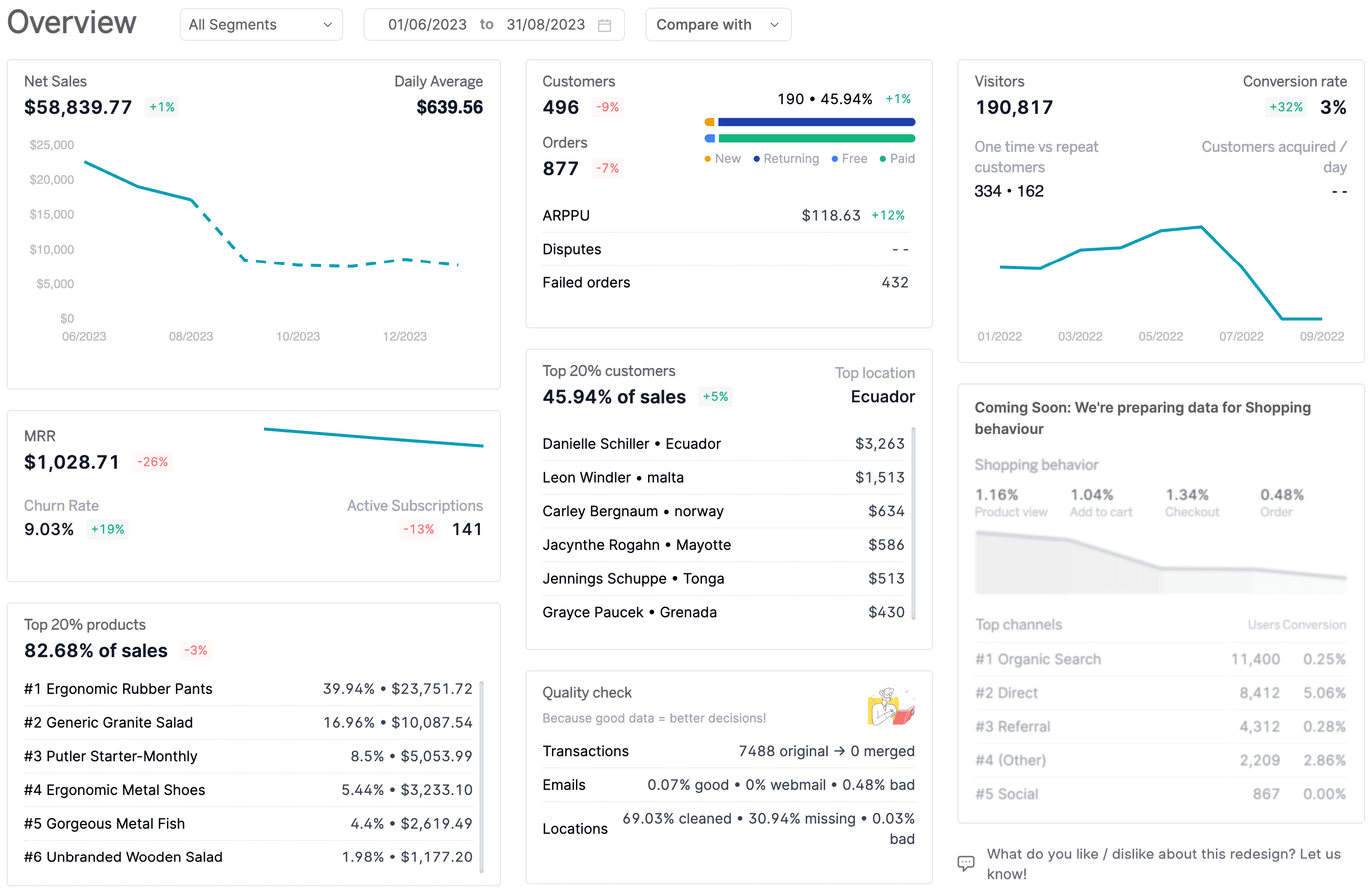
Pricing:
- Starter plan – $20/month
- Growth plan – starts at $50/month
Key Features:
- 17+ integrations.
- Unlimited filtering capabilities.
- RFM segmentation.
- Comprehensive reports.
- Personalized growth recommendations.
- Import multiple sources of eCommerce data.
- Automatic deduplication, enrichment, currency, and timezone conversion.
- 153+ key performance indicators and reports.
- Issue refunds, and manage subscriptions.
- Inbound & outbound API.
Pros:
- Intuitive layout
- Ease of use
- Easy statistics for products and total orders – easy to track and follow customers – UI is really great and comfortable to work with
- It is great for managing a lot of people, schedules, and finances
Cons:
- No inventory reporting
Metrilo
Metrilo is the best eCommerce analytical tool for eCommerce businesses as it provides actionable analytics and helps track customer data to boost your sales. It also helps to find the retention analysis report that helps to understand the customer lifecycle value to turn one-time buyers into loyal customers.
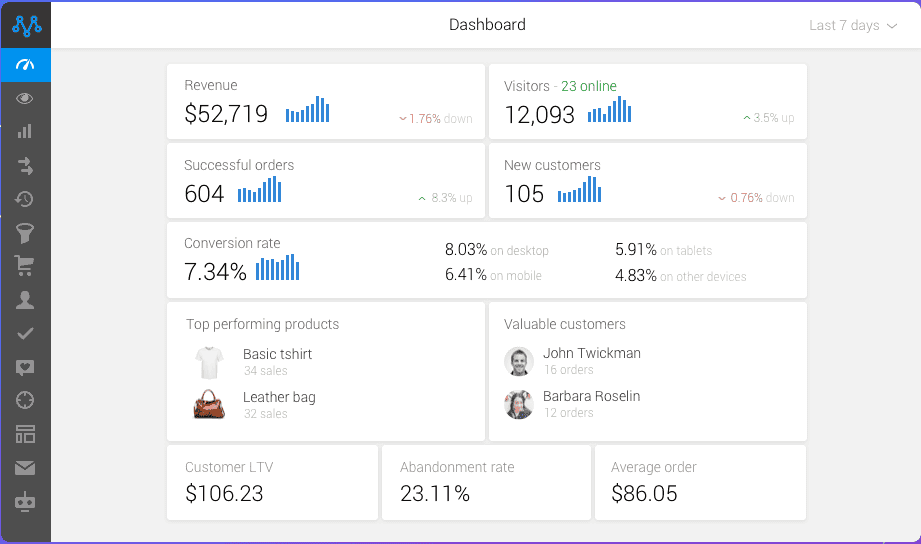
Pricing:
Essential: $119/month
Pro: $379/month
Premium: Starts at $599/month
Features:
- Catalog management
- Channel management
- Customer accounts
- Email marketing
- Loyalty program
- Order management
- Promotions management
Pros:
- Easy to install, easy to use and great support
- Very user-friendly interface.
- Nice trigger-based email automation.
Cons:
- The lead generation by mail has to be improved.
- Lacks order, inventory, and shipping management features.
Clicky
Clicky is a “Web 2.0” analytics tool that makes it easy and fun to discover how people are using your website. Clicky has paid options but the free plan allows you to track one website up to 3,000 daily page views total.
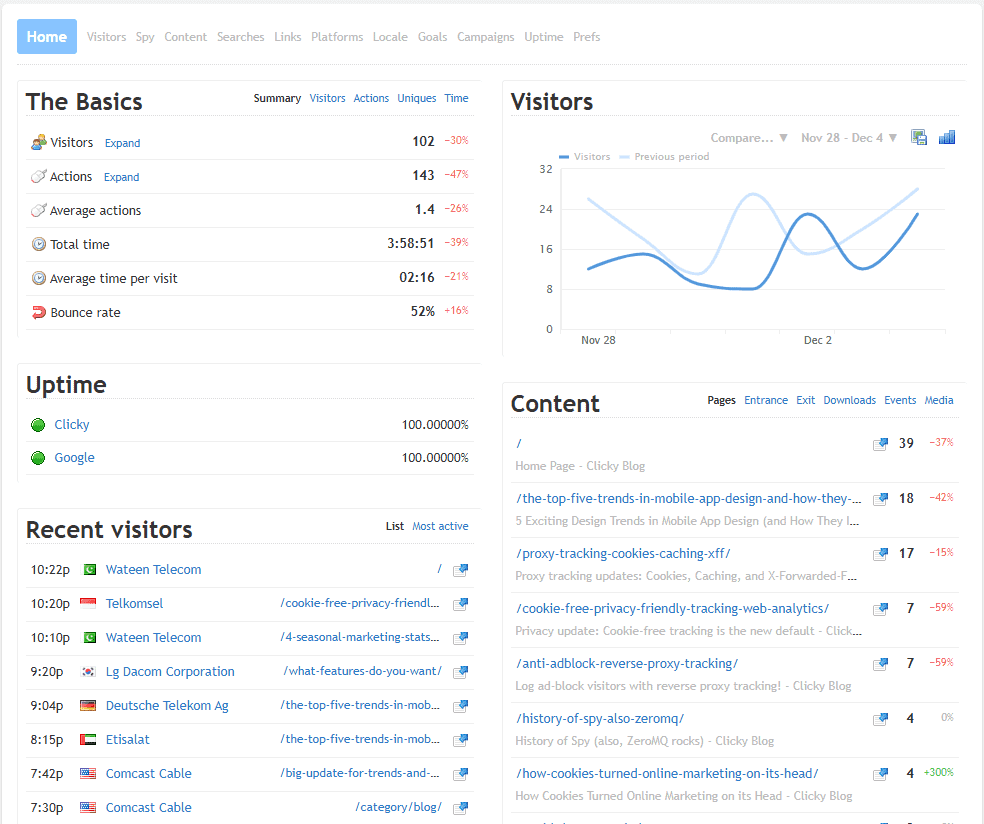
Pricing: start at $9.9/month
Features:
- Sessions – Digital analytics
- Standard event tracking
- Real-time reporting
- Site search reporting
- Custom reports and dashboards
Pros:
- Simplicity and user-friendliness.
- Clicky has a great interface and its real-time analytics are excellent.
Cons:
- It’s hard to justify the expense for a paid version of Clicky when you can get so many of the same features with Google.
Adobe Marketing Cloud
Adobe Marketing Cloud is again a Web 2.0 analytics tool that makes it easy to discover how people are using your website. The best part of Adobe is that it commits to providing accurate customer insights to the right person at the right time, helping businesses make informed decisions that optimize sales and grow their eCommerce business.
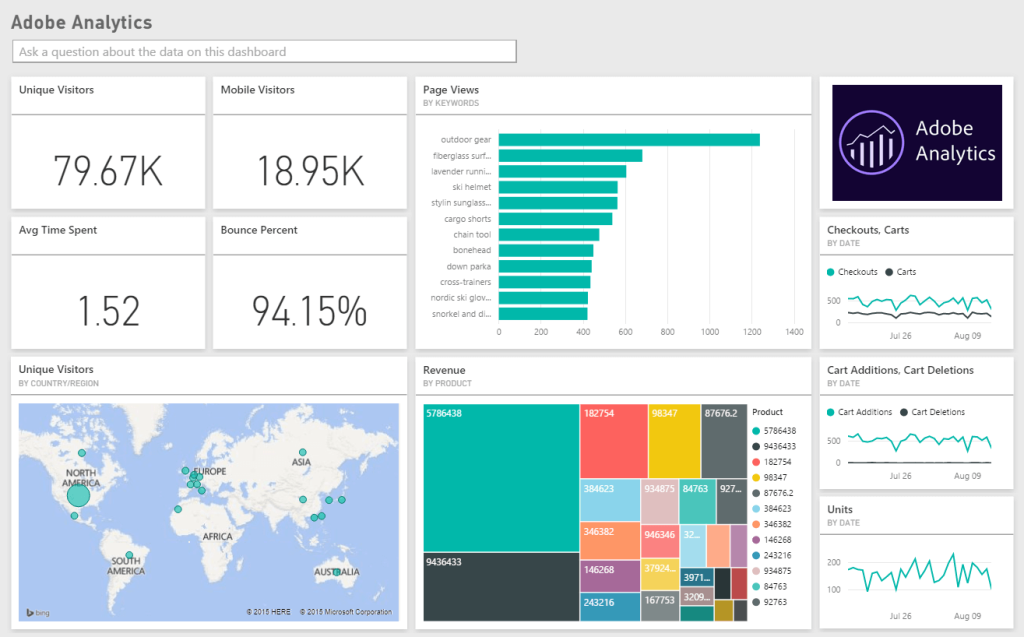
Pricing: Contact Adobe directly for pricing information.
Features:
- A/B testing
- Email marketing management
- Engagement analytics
- Multi-channel marketing
- Reporting & statistics
Pros:
- Adobe Marketing Cloud allows companies to store various types of content in one secure location.
- Large-scale performance, huge ecosystems of implementation partners, and integration technology allow for very complex needs to be met.
Cons:
- Adobe Marketing Cloud can get expensive.
- It also happens that Adobe servers crash when organizing mailing via email, which is why not all of our partners receive letters.
Crazy Egg
It is the best eCommerce reporting tool for online stores that helps to understand programming and represents considerable authority in heatmaps. Crazy Egg provides you with eye-tracking tools to find out what parts of your website are getting more traffic and which parts are being ignored.
Crazy Egg keeps your eCommerce reports simple and easy to read, so you can collect your website information without getting confused.
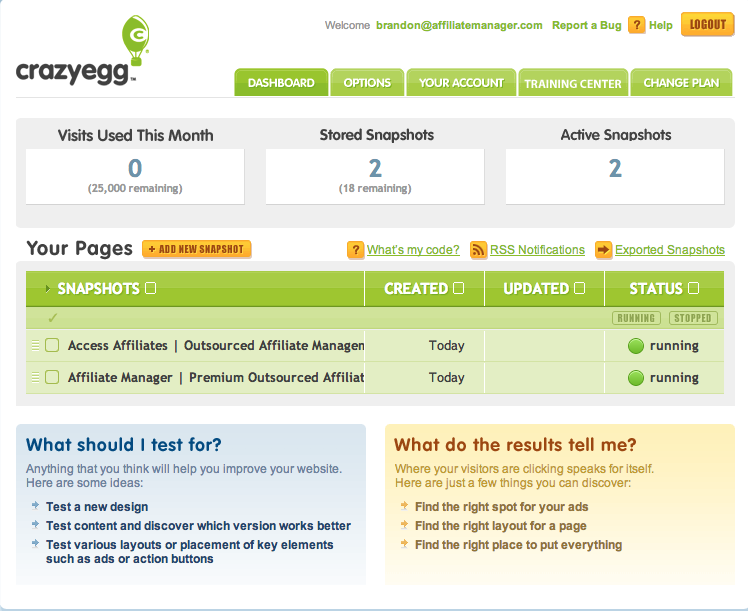
Pricing: Start at $29/month
Features:
- Website visitor tracking
- Website visitor activity recording
- Tracking iframe and Flash objects
- Multiple domain tracking
- A/B testing
- URL-based goal setting & tracking
Pros:
- Insights are easy to read and understand.
- Easy to integrate with WordPress themes Heatmaps feature is the best in its class
Cons
- Time-consuming, hours and hours of recordings to watch and annotate.
- Sometimes downloading several reports at the same time is difficult. Not all of them get downloaded
HumCommerce
HumCommerce is a trending eCommerce analytics software that helps you understand how website visitors interact with your online store. It is the best behavioral analytics tool that helps eCommerce store owners to know how people are interacting on your website.
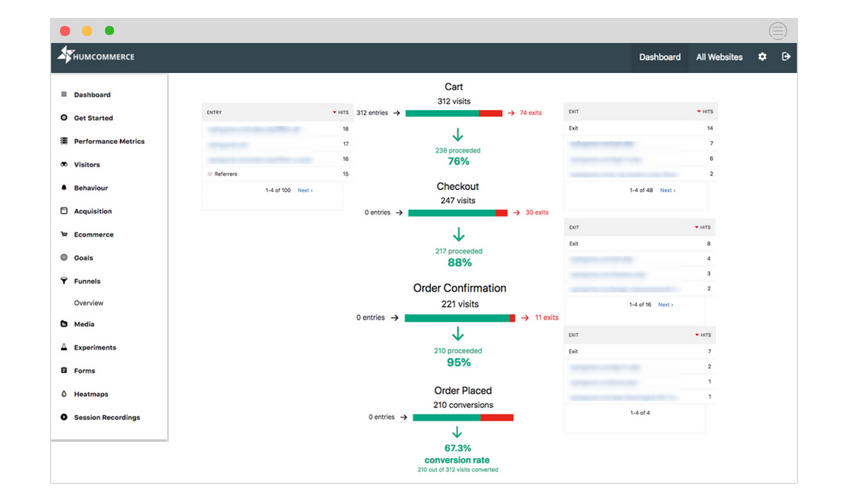
Pricing:
Starting: $9.00/month/user
Features:
- Screen activity recording
- Unlimited funnels
- Visual funnel representation
- Real time data collection
- Heat maps
Pros:
- Simple to execute/introduce.
- Tracks internet business information inside and out.
- Decides client association over all internet business stages.
- Has a wide scope of highlights, for example, profound internet business joining, guest meeting chronicles, heatmaps, and A/B testing,
Cons:
- Lacks the survey feature
Hotjar
Hotjar is an eCommerce analytics software that combines the quality and quantity of user data in a Single eCommerce dashboard to view the user experience of the website. It provides eCommerce store owners deep website analysis reports with the feedback tools to collect the tracking report of visitors’ activities on your website via heatmaps, and sessions recorded in video format, conversion funnel, and customer behavior.
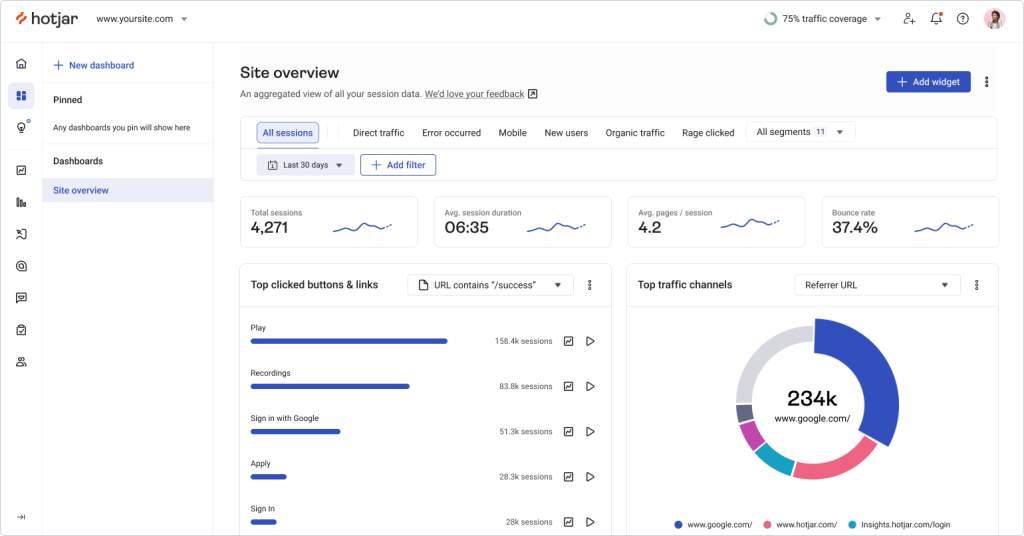
Pricing:
Basic: Free
Plus: $32/month
Business: $80/month
Features:
- Multi-device support
- Sites and organization settings.
- Behavior logic & feedback polls.
- Visitor targeting & recordings.
Pros:
- Easy to see the click, move, and scroll heatmaps.
- Very easy to learn with the free version before deciding to upgrade.
Cons
- There is no easy way to track dynamic content
- Not as robust in integration to website analytics for additional slicing of the data.
Matomo
Matomo (formerly Piwik) is an open-source eCommerce analytics tool that provides businesses with complete control and ownership of their data. Unlike many other analytics platforms, Matomo ensures 100% data privacy and offers comprehensive tracking without compromising user information.
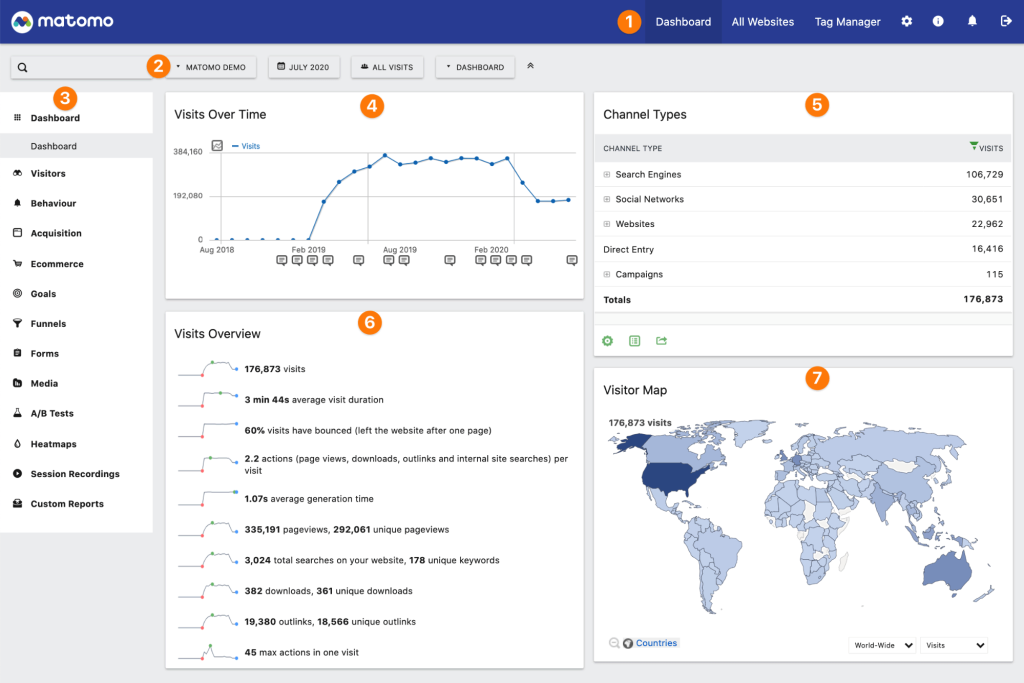
Pricing: INR 1,690/month
Features:
- Real-time web analytics
- Customizable dashboards
- Conversion tracking
- Goal tracking
- eCommerce analytics
- Multi-site management
- Heatmaps and session recordings
Pros:
- No third-party data sharing
- Highly customizable and flexible
- GDPR and privacy-law compliant
- Unlimited websites and users in some plans
- Detailed eCommerce tracking
- Open-source with community support
Cons:
- Steeper learning curve compared to Google Analytics
- Requires more technical setup
- Self-hosted version needs server management
- Less intuitive interface for beginners
Final Thoughts
Don’t let a lack of data hinder your eCommerce growth. Use analytics tools to gain insights into your customers, sales, and products, helping you optimize your site and boost revenue.
Choosing the right eCommerce analytics tool depends on your business size, goals, and budget. If you want an all-in-one analytics solution, Putler is a fantastic choice. If you prefer a free tool, Google Analytics is a solid option.
Regardless of your choice, leveraging analytics is crucial for growth, sales optimization, and improving customer experience. If you still have any doubts, feel free to get in touch with us.
eCommerce Analytics Tools FAQs
How do I track my eCommerce analytics?
Use a tool like Putler to monitor sales, customer behavior, and product performance. Connect it to your eCommerce store and start analyzing real-time data.
Which eCommerce analytics tool is the best?
The best eCommerce analytics tool depends on your needs and budget. Putler stands out as a comprehensive option with features for tracking revenue, conversion rates, and customer behavior.
It integrates with platforms like WooCommerce, Shopify, and PayPal, offering detailed insights into business performance. Choose a tool that aligns with your goals and provides the insights you need for data-driven growth.
- eCommerce analytics & Smart Insights for your business
- Complete Guide on eCommerce Analytics
- Top eCommerce Analytics Tools
- The best eCommerce analytical tools
- The Best eCommerce Insights For Brands in 2024
